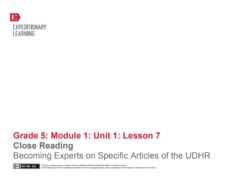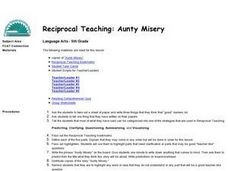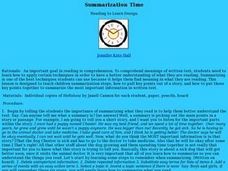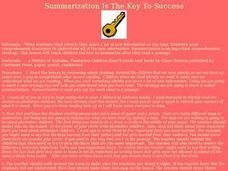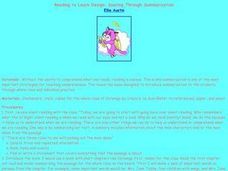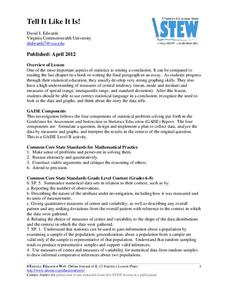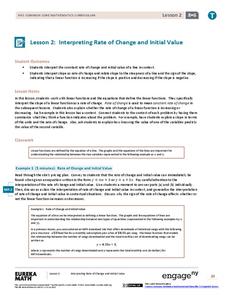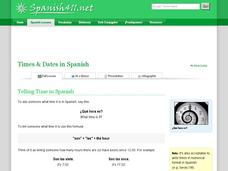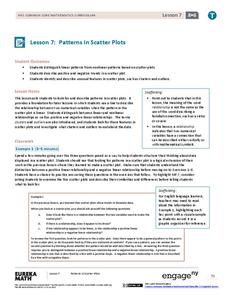Curated OER
Summarizing is Fun with Flat Stanley!
Students read the book "Flat Stanley" by Jeff Brown. Through modeling and guided practice, as a class, they complete a story map and 1-paragraph summary of the first chapter in the book. Then, in groups, they follow the same procedure...
Curated OER
The Juicy Stuff Matters
Students explore and practice the strategy of summarization and scaffolding while mastering how to recap the details from a story and/or singling out what is important to recall from a story. They summarize the book, "How the Grinch...
Curated OER
To Sum it all Up...
Students observe and demonstrate the process of summarizing text. They read and discuss the steps to summarize text, then in small groups read and summarize an article about frogs from "National Geographic" online. Independently they...
Curated OER
Creating Comic Strips
Students recognize the elements needed to create a comic strip. In this comic strip lesson, student understand that comic strips need words and pictures. Students find differences and similarities in comic strips. Students describe how...
EngageNY
Close Reading: Becoming Experts on Specific Articles of the UDHR
A continuation of the previous instructional activity, which is part of a larger group of lessons on human rights (see additional materials). Here, in Lesson 7, your class will explore more articles from the Universal Declaration of...
Digital Writing and Research Lab's – Lesson Plans
Teaching Close Reading through Short Composition/Revision
This activity may have writers evaluate short compositions, but their subjects are quite tall: great Americans. Pupils read one another's compositions and closely examine how specific phrases and diction contribute to shaping American...
Reed Novel Studies
Beezus and Ramona Novel Study
What are some of the advantages and disadvantages of having siblings? Pupils explore this topic with the Beezus and Ramona novel study. Additionally, scholars answer questions about chapter one of the time-honored book by Beverly Cleary...
Curated OER
Reciprocal Teaching: Aunty Misery
Fifth graders investigate the qualities of a good reader by participating in a role play with the provided scripts. They focus on the five main strategies of good readers -- predicting, clarifying, questioning, summarizing, and...
Curated OER
Today’s Telephone
Does your class know the history behind today's telephone? They will after reading a very interesting one-page informational passage. They'll learn all about the way phones have progressed to the amazing devices they've become as they...
Curated OER
Summarization Time
Students write summaries in this lesson. They read "Stellaluna" by Jaell Cannon independently and answer story map questions: who, what, when, where, and why. They then take the answers to these questions and write an individual summary.
Curated OER
Strength in Summarizing
Third graders practice summarizing passages while creating a fishbone map of important details in non-fiction text. They examine how to tell the difference between important and less important details by highlighting them in reading...
Curated OER
Summarization Is The Key To Success
Fourth graders exercise the strategies of silent reading and summarization to acquire new and important information from a text. They silently read and summarize page eighty-two in their "A History of Alabama" books. A review of...
Curated OER
Reading to Learn Design: Soaring Through Summarization
Learners are introduced to and practice techniques and strategies to master the art of summarization. They read, discuss and summarize chapter 3 in "Catwings," by Ursula K. LeGuin. Steps to follow for summarizing is included within this...
Curated OER
Express Yourself Lesson Seed 3
If you're looking to set your class up for writing effective arguments, try out this idea. While originally created with freedom as a guiding idea, the activity could easily be adapted for other themes. As a class, create a chart of...
Curated OER
Guided Reading: Asking Questions
Here is a reading strategies lesson in which learners use post it notes to create a bulletin board. They post their new questions on the bulletin board and look back at questions they have already learned the answer to. A great idea,...
American Statistical Association
Tell it Like it is!
Scholars apply prior knowledge of statistics to write a conclusion. They summarize using correct academic language and tell the story of the data.
EngageNY
Interpreting Rate of Change and Initial Value
Building on knowledge from the previous lesson, the second lesson in this unit teaches scholars to identify and interpret rate of change and initial value of a linear function in context. They investigate how slope expresses the...
Curated OER
Plot the Oysters' Peril!
Use comic strips to teach sequencing in narrative poetry. As homework, each class member selects a comic strip with 4-8 frames, cuts the frames apart, places the pieces in an envelope, and brings the envelope to class. Class members swap...
Curated OER
Modernism in Poetry, Painting, and Music
Are you teaching Modernism to your class? Connect different areas of artistic expression in the Modernist Era. Learners read T.S. Eliot, view art by Pablo Picasso, and listen to a Modernist musical composition. This final assignment is...
Curated OER
Times & Dates in Spanish
Use this information, presentation, and infographic to build several lessons on telling the time and expressing the date in Spanish. The information is broken into topics and includes many examples and exceptions to the standard rules....
Code.org
Cleaning Data
"Clean the data!" "I did not know it was dirty." Introduce your class to the process of cleaning data so that it can analyze it. Groups work through a guide that demonstrates the common ways to filter and sort data. Pairs then...
Science Geek
Properties of Acids and Bases
It's all about that base! Teach the properties of acids and bases using the sixth slide show presentation in a series of seven. The lesson discusses acid and base properties and reactions. Pupils also see the effect on indicators when...
EngageNY
Patterns in Scatter Plots
Class members investigate relationships between two variables in the seventh installment of a 16-part module that teaches scholars how to find and describe patterns in scatter plots. Young mathematicians consider linear/nonlinear...
PBS
NOVA Cybersecurity Lab Lesson Plan
Don't be fooled by cyber scams! An informative lesson teaches techies about cybersecurity. They watch videos, play a game, and engage in discussion to improve their understanding of online safety.






